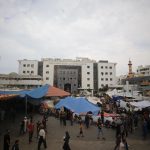Palestinian Authority Resigns as Abbas Eyes Integrating Hamas With Technocrats
Jerusalem, 26 February, 2024 (TPS-IL) -- The Palestinian Authority resigned on Monday and is being replaced by a transitional government of technocrats as Palestinian President Mahmoud Abbas eyes returning to power in post-war Gaza.
The development comes against the backdrop of heavy US and Arab pressure on the PA to reform itself so it can have a role in governing post-war Gaza. However, this position is at odds with Israel. Prime Minister Benjamin has said he objects to allowing the Palestinian Authority or Hamas to return to the Strip.
As the Tazpit Press Service reported in mid-February, the candidate to head the new technocratic PA is Dr. Mohammad Mustafa, a Palestinian economist, chairman of the Palestine Investment Fund, and a close associate of Abbas. He would replace outgoing Prime Minister Mohammad Shtayyeh.
Sources told TPS that they believe Mustafa will be better received in Washington and Arab capitals than Shtayyeh, comparing Mustafa to Salam Fayyad, another economist who served as Palestinian Prime Minister from 2007-2012. Fayyad was respected by the West but had no Palestinian political base.
Palestinian sources have told TPS that the Biden administration is demanding a long series of reforms. They include cutting down the PA’s bloated and inefficient bureaucracy, reforming its financial system, initiating an internal self-investigation mechanism within the Palestinian Preventive Security to make it more accountable, and revising school curriculum that incites children against Israel.
Integrating Hamas
Abbas ultimately wants to form a national unity government with “soft core” members of Hamas. Officials in Ramallah tell TPS they regard Hamas as a legitimate player in Palestinian politics. Abbas cannot ignore Hamas because it consistently trounces Fatah in public opinion polls. Abbas wants Hamas to join the Palestine Liberation Organization — an umbrella group of Palestinian political organizations that he leads — and recognize the Israeli-Palestinian peace agreements.
Hamas is divided on joining the PLO on those terms. Members of Hamas’s “Qatari camp,” have hinted that they are prepared to meet Abbas’s terms and integrate into the PLO if it means having a role in running post-war Gaza. But members of Hamas’s “Iranian camp” are opposed to those conditions.
The Palestinian sources also add that Abbas was very disturbed by a recent New York Times interview with Mohammed Dahlan, a rival of Abbas, who called for a new Palestinian leader backed by the moderate Arab states to replace Abbas. “No Abbas, no Hamas,” is the mantra heard in Egypt, Jordan, Saudi Arabia and the United Arab Emirates. Dahlan was also Fatah’s strongman in Gaza when Hamas violently seized control of the Strip from the PA in 2007.
Nobody in Ramallah believes Abbas will see the reforms through. A November survey by the Palestinian Center for Policy and Survey Research found that 90% of the Palestinians living in Judea and Samaria wanted Abbas to resign, while 60% said the Palestinian Authority is ineffective and should be dissolved.
Palestinians have not held national elections since 2005 and Abbas is now in the 19th year of what was supposed to be a four-year term. Since then, Abbas has canceled several attempted elections amid Fatah-Hamas disagreements, most recently in 2021.
At least 1,200 people were killed and 240 Israelis and foreigners were taken hostage in Hamas’s attacks on Israeli communities near the Gaza border on October 7. Of the remaining 134 hostages, Israel recently declared 31 of them dead.







